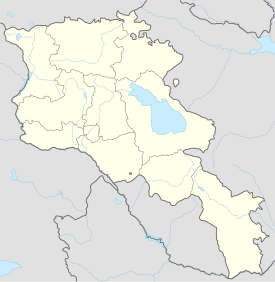| Lori Fortress Լոռի բերդ | |
|---|---|
| Lori Province, Armenia | |
 The fortress entrance The fortress entrance | |
 Լոռի բերդ | |
| Coordinates | 41°00′09″N 44°25′52″E / 41.002638°N 44.4312°E / 41.002638; 44.4312 |
| Type | Fortress |
| Site information | |
| Open to the public | Yes |
| Condition | Some portion of the fortification walls, bath house and other buildings. |
| Site history | |
| Built by | King David I Anhoghin |
Lori Fortress (Armenian: Լոռի բերդ) is an 11th-century Armenian fortress located near the Lori Berd village in Lori Province, Armenia. The fortress was built by David Anhoghin to become the capital of Kingdom of Tashir-Dzoraget in 1065.
The Lori Fortress was the site where the Georgian king Giorgi III of Georgia trapped and besieged his rebellious nephew, Demna of Georgia in 1177.
The fortress was captured by the Mongol commander Chagatai the Elder in 1239.
As of 2024 there are restoration works going on to preserve the fortress. They are estimated to be finished after the several years. Fortress walls, two bath houses and a civic building which once served as a church are planned to be restored.
Description and landmarks
The fortress is built out of black tuff stone and is located on a mountainous plateau situated 1490 metres above the sea level, which lies on the intersection of Urut and Dzoraget rivers. There were once approximately 10.000 inhabitants living in the fortress. The following structures are located in it:
Bathrooms
The fortress has two bathrooms, a larger one and a smaller one. They had a heat room, bathroom and a fitting room. The bathrooms also had a dome, which served for lighting and ventilation with clay pipes installed into city walls ensuring the system of water irrigation.
Civic house
The remaining civic house had a 14 x 12 layout and 5 doors. The main purpose of it remains unknown, but it was turned into the religious building later on: first into the mosque (in 14th and 15th centuries), then into the church in the 18th century.
Gallery
-
 Lori Fortress view during the day
Lori Fortress view during the day
-
Khachkar near the Lori fortress
-
 Walls of Lori fortress
Walls of Lori fortress
-
 Entry in Lori fortress
Entry in Lori fortress
-

-
 Ruined Armenian church inside the fortress
Ruined Armenian church inside the fortress
-
 Bridge leading to the fortress
Bridge leading to the fortress
See Also
References
- Holding, Nicholas (2006). Armenia: with Nagorno Karabagh. Bradt Travel Guides ltd. p. 161. ISBN 9781841621630. Retrieved 25 July 2011.
Notes
- A. E. Redgate. The Armenians. — Oxford: Blackwell, 2000. — P. 210.
- Kartlis Tskhovreba, History and Eulogies of Monarchs, Part 9
- Boyle, John Andrew (1977). The Mongol World Empire, 1206-1370. Variorum Reprints. ISBN 978-0-86078-002-1.
- "Раскопки в Лори Берд и реставрация церкви Николая Чудотворца: как в Армении восстанавливают памятники культуры?". am.mir24.tv. Retrieved 2024-09-19.
- Jerejian, Grace (June 29, 2023). "Lori Fortress: A Medieval Beauty". Armenia Travel. Retrieved 19 September 2024.
External links
| Historical Armenian fortresses and castles | |
|---|---|
| Armenia | |
| Azerbaijan | |
| Turkey | |
This castle-related article is a stub. You can help Misplaced Pages by expanding it. |
This Armenia-related article is a stub. You can help Misplaced Pages by expanding it. |
